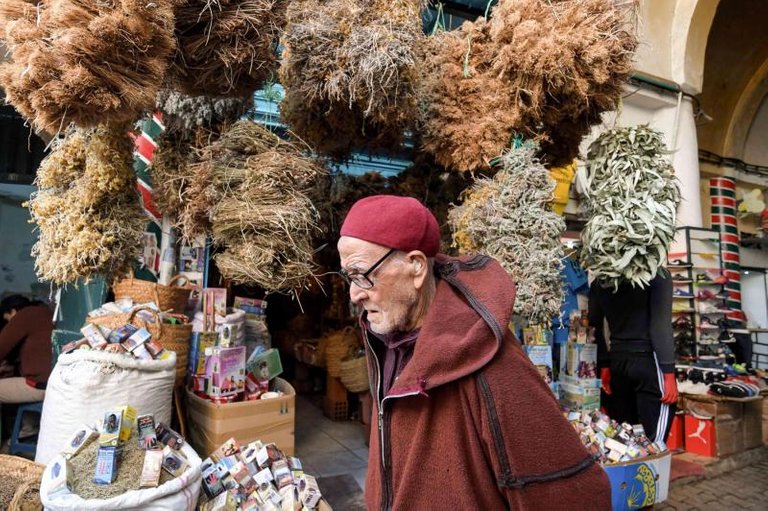Some Tunisians stick to herbs, as their grandparents used them as medicinal treatments. For them, it is more useful than chemical, which refreshes the dozens of herbal markets that are spread in most of the Tunisian provinces.
As soon as you enter one of the narrow alleys in the old city of the capital Tunis and reach Souk Al-Blat, you will smell the various medicinal herbs that grow in the mountainous regions
Some of these herbs were hung on storefronts, while others were displayed in bags laid out on store floors or in front of them, with the name of what is contained on each of them.
You rarely come back disappointed and do not find what you can do from those herbs that were and are still used in the treatment of some diseases.
In front of one of these shops, locals wait in lines to buy marshmallow or "khatmia" seeds. One of his relatives advised him of those seeds that cure Vitiligo due to the lack of a cure for this disease and there is no harm in trying it as long as I would put it on the places of vitiligo and would not drink it.”
The popularity of herbal remedies in Iraq ... the destination of the poor
The market for tiles in Tunisia is the largest and most famous market for selling herbs, and traders point out that it dates back to the Hafsid era. It employs a number of elderly merchants.
Some of these herbs are brought from the heart of the Tunisian desert, others are brought from the mountains in the northwest, while other types not available in Tunisia are imported from Africa, Pakistan, Iran, Saudi Arabia, and Morocco."
Various herbs (New Arab)
The customers of these stores are not from the simple intellectually or from the limited social groups. Sometimes, well-off customers come to us if they give up on treating some diseases.
They are looking for herbs to treat some conditions, such as infertility, frigidity, kidney failure, and even cancerous diseases.
The types of diseases that his customers complain about vary according to the seasons. In the summer, skin diseases, such as acne and hair loss, are common, while in the winter, rheumatism, shortness of breath and **colds// increase, and in the fall, kidney and urinary tract diseases.
in the market, there are about three thousand types of herbs that are used as medicines that help treat mental, internal, skin diseases and even some incurable and chronic diseases."
In the old markets, perfumers treat those who go to them without a legal framework that regulates herbal remedies as a type of alternative medicine officially recognized by the Ministry of Health.
Tunisians have accepted since ancient times natural herbs that occupy an important position in a part of society, as they believe that they provide healing from diseases that doctors may be unable to treat, without most of them having any knowledge about the types of those herbs or having knowledge of studies that came in favor of this.
thearabweekly

And these people do not think about whether their safety is at stake, they only hear about these prescriptions, whether from the Internet or those close to them, without asking whether they are effective or if it is just quackery and selling illusions to patients.
here's a news report by FRANCE24 showing "al-Balat" market of herbals and natural remedies.
If ever went there, ask for "Haj-Mohamed" or Dean of the herbalists (he's the most popular herbalist and even people from foreign countries such as France and Germany also some neighboring countries Algeria and lybia go to him for herbal recommendations)